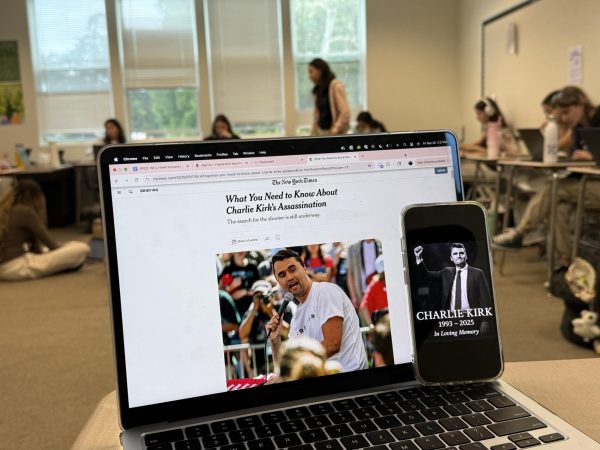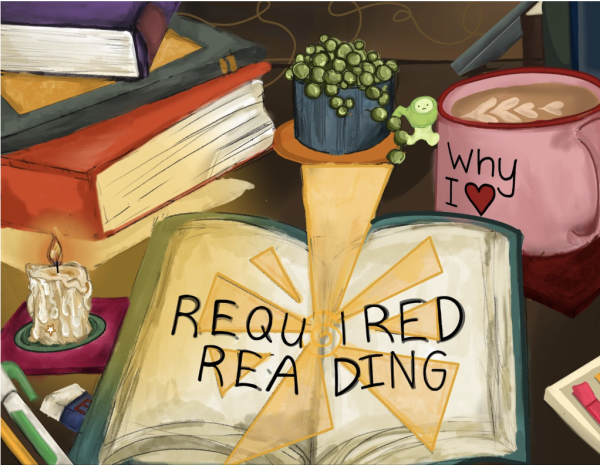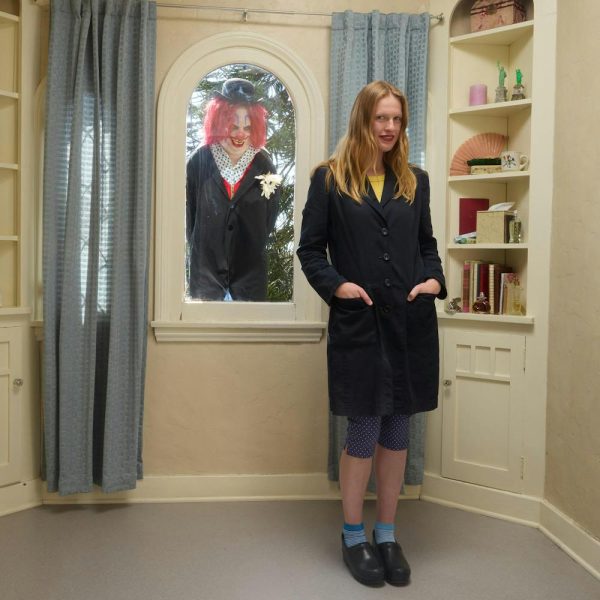What Eminem Taught Me About Self-Love

Eminem in 2012
One day, early in the school year, I sat in the Norton Simon Cafe and opened a fresh book I’d recently bought. It wasn’t long before my head began hurting. I was trying too hard; I couldn’t focus. I figured a walk in the garden would help, but my legs didn’t move. A sense of failure rose in me, which I tried to push down with the weight of a portobello sandwich and ice cream bar. Eventually, I put on my headphones and chose a song: “Rock Bottom” by Eminem.
That’s rock bottom—when this life makes you mad enough to kill, that’s rock bottom. When you want something bad enough to steal, that’s rock bottom. When you feel like you’ve had it up to here ‘cause you’re mad enough to scream but you’re sad enough to tear, that’s rock bottom.
“Rock Bottom” is about Eminem’s past money struggles. In a voice tightening with rage, he lists everything that gives him stress, speaks of days slipping away with anxiety and despair, and his begging prayers. Absorbing the lyrics, I finally got up and walked off my pain.
I began listening to Eminem in the fall of my senior year, but the decline in my mental health began junior year, in the depths of lockdown. Like many others, I fought daily with my parents, and with no change of environment, grudges festered, and words turned venomous. This, added to the stresses of junior year, made everything more difficult. It felt like something was pressing onto my chest. Remote learning also hurt my GPA, which worsened matters.
The following summer, my energy, focus, and will declined, and I felt I had no control over my life or pain. That’s when I discovered two Eminem songs I really liked: “The Real Slim Shady” and “Without Me.” Until then, I only knew one Eminem song: “Love the Way You Lie.”
The first quarter of my senior year was rough. As I dragged myself around campus, I recalled two old friends who said that the defiance and anxiety in Eminem’s music helps with mental pain. So, I researched his songs on YouTube and played a couple nightly, becoming fascinated by his intimate lyrics and the different tones of his songs. Within days, I composed a playlist of over twenty songs, a playlist that would triple, spanning eight Eminem albums, and become what I listen to most of the time.
Eminem’s music has become an emotional outlet for much of what I experience: confidence, anger, cynicism, sadness. My YouTube history of his songs is a detailed timeline of my emotions throughout the day. I may start with “Rap God,” or a song he shares with another rapper, then feel worn and play “Beautiful” or “Mockingbird,” a lullaby for his daughter. When I feel sad and cynical, my go-to is “Superman” or “Puke,” ascending to songs of rage, only to crash with “Marshall Mathers” and “Deja Vu.” I also go from “Talkin’ 2 Myself” and “Space Bound” to skipping with “Business,” “We Made You,” and “Just Don’t Give a F—” very easily.
Listening to Eminem’s music also gives me permission to feel things I don’t want to or can’t admit to myself. I may be laughing one minute, but excuse myself to go play “Never Really Over” or “When I’m Gone.” I blast “‘Till I Collapse” or “No Love” when I’m numb or unsure what I’m feeling. I search my anger with “Like Toy Soldiers” and “Love You More.” Sometimes, when my head is nodding with sleep, I find myself tapping on “White America.”
I know that Eminem’s music, as well as who he is as a person, is controversial. He employs Slim Shady, an alter ego who robs, fights, kills, does drugs, and assaults women, as a way to be in conversation with some of his darker impulses and thoughts. In the early 2000s, Eminem was often blamed for teen violence and addiction. He touches on this controversy in many songs, pointing out that his music reveals the unspoken anxieties and pain amongst young adults, feelings I am all too familiar with myself.
Take his song “Sing for the Moment.” The first time I heard it, I was sitting alone in a classroom writing college essays. I wasn’t really paying attention until I heard this.
Or for anyone who’s ever been through s— in they lives, so they sit and they cry at night, wishin’ they’d die, ‘till they throw on a rap record and they sit and they vibe—
I stopped. That was exactly how I had spent the previous night. I hit replay.
These ideas are nightmares for white parents whose worst fear is a child with dyed hair and who likes earrings. Like whatever they say has no bearing. It’s so scary in a house that allows no swearing to see him walking around with his headphones blaring, alone in his own zone, cold and he don’t care. He’s a problem child. What bothers him all comes out when he talks about his f— dad walking out.
I thought of my parents scolding me for my bad moods, not liking my headphones, earrings, and rings. I thought about all the expectations I was suddenly unable to meet and the heartbreaking disappointment that followed. Without feeling that the people who meant a lot to me were proud of who I was, I had lost a great deal of my self-love and drive in life.
Eminem’s music was validation, proof that I wasn’t messed up, attention-seeking, weak, or crazy. It has helped me convey my pain, heal, and persevere from times when I feel broken. When Eminem screams about his rage and demons, he helps me face my rage in my boundaries. I find ground in holding on to who I want to be and how I want to keep going. And the fact that Eminem is more than Slim Shady helps me navigate my humanity and self-love.

It is Eminem’s transgressive nature that has helped me more than any other artist. He is not vague or shy about his rage, despair, and insecurity. His honesty was just what I needed.
By the end of the first quarter, I had realized something very important: even though the forces that give me pain and anxiety aren’t really in my control, my ability to help myself and persevere through them nevertheless is. And helping myself was a duty of mine to me.
So, as Winter Break approached, and I worried that the brief isolation would lead to fights at home and a lot of pain in the aftermath, I took a cue from Love Your Mind Week and bought myself packs of beads and string to busy and mentor myself with.
In “Not Afraid,” which is about Eminem’s quest for sobriety amidst the loss of a childhood friend, which led to a five-year hiatus and dire mental and physical health problems, he raps:
And I just can’t keep living this way. So, starting today, I’m breaking out of this cage. I’m standing up, Imma face my demons. I’m mannin’ up, Imma hold my ground. I’ve had enough, now I’m so fed up, time to put my life back together right now.
It was a message and invitation for me to do the same.
That song makes me want to get up and walk instead of sleeping all afternoon. Now, I can say that although my dark cloud isn’t done with me, I’m no longer afraid that I won’t make it.
But it’s still hard to face the future with your ambitions and dreams without despair and fear over the past. I feel like I’ve lost two years of high school – one to remote learning and the other to the pain that followed, and time is moving too fast for me to enjoy anything.
When I’m in despair about my future, Eminem’s reflection on the past in “The Monster” is especially meaningful to me. He reflects on the good and bad impacts of his fame, blaming it all on his inner monster. In the video, he meets the monster, a version of himself locked up, scribbling verses on paper. In the end, he walks away from the monster, refusing to let it go.
That song is how I envision myself and how I hold onto my life. I sometimes want to break out of my body, to escape this cycle forever, but I carry on by accepting my pain. As a young woman, I haven’t turned out as some people wished, but I’m okay with that. Even as I hurt or feel anxious, I won’t indulge in contrasting myself and others. I will always choose me.
I’m now willing to fight my dark cloud by living. There are so many places I’ve been to and things I’ve done while I was drowning in despair and misery, and I’m willing to revisit and do them all again, reflecting on how I’ve returned, insistent on going on anyway. In Eminem’s words, “until the roof comes off, until my legs give out from under me, I will not fall. I will stand tall.” After learning from his music to speak of, understand, and shape my pain, I know that going on is my constant truth, and I am in the process of living with love again.




























![Dr. Zanita Kelly, Director of Lower and Middle School, pictured above, and the rest of Westridge Administration were instrumental to providing Westridge faculty and staff the support they needed after the Eaton fire. "[Teachers] are part of the community," said Dr. Kelly. "Just like our families and students."](https://westridgespyglass.org/wp-content/uploads/2025/03/dr.-kellyyy-1-e1748143600809.png)



























Gustavo Barbieri • Dec 28, 2024 at 1:31 pm
what an amazing story. i loved your writing
Erau123 • Feb 26, 2022 at 6:50 pm
Beautiful and brave.